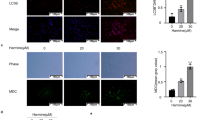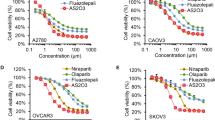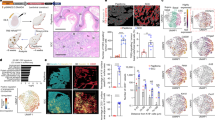Abstract
The process of autophagy has been described in detail at the molecular level in normal cells, but less is known of its regulation in cancer cells. Aplasia Ras homolog member I (ARHI; DIRAS3) is an imprinted tumor suppressor gene that is downregulated in multiple malignancies including ovarian cancer. Re-expression of ARHI slows proliferation, inhibits motility, induces autophagy and produces tumor dormancy. Our previous studies have implicated autophagy in the survival of dormant ovarian cancer cells and have shown that ARHI is required for autophagy induced by starvation or rapamycin treatment. Re-expression of ARHI in ovarian cancer cells blocks signaling through the PI3K and Ras/MAP pathways, which, in turn, downregulates mTOR and initiates autophagy. Here we show that ARHI is required for autophagy-meditated cancer cell arrest and ARHI inhibits signaling through PI3K/AKT and Ras/MAP by enhancing internalization and degradation of the epidermal growth factor receptor. ARHI-mediated downregulation of PI3K/AKT and Ras/ERK signaling also decreases phosphorylation of FOXo3a, which sequesters this transcription factor in the nucleus. Nuclear retention of FOXo3a induces ATG4 and MAP-LC3-I, required for maturation of autophagosomes, and also increases the expression of Rab7, required for fusion of autophagosomes with lysosomes. Following the knockdown of FOXo3a or Rab7, autophagolysosome formation was observed but was markedly inhibited, resulting in numerous enlarged autophagosomes. ARHI expression correlates with LC3 expression and FOXo3a nuclear localization in surgical specimens of ovarian cancer. Thus, ARHI contributes to the induction of autophagy through multiple mechanisms in ovarian cancer cells.
Similar content being viewed by others
Log in or create a free account to read this content
Gain free access to this article, as well as selected content from this journal and more on nature.com
or
Abbreviations
- ARHI:
-
aplasia Ras homolog member I
- LC3:
-
myosin-associated protein light chain 3
- DOX:
-
doxycycline
- TEM:
-
transmission electron microscopy
References
Cecconi F, Levine B . The role of autophagy in mammalian development: cell makeover rather than cell death. Dev Cell 2008; 15: 344–357.
Melendez A, Levine B . Autophagy in C. elegans. WormBook 2009; 24: 1–26.
Rosen DG, Wang L, Jain AN, Lu KH, Luo RZ, Yu Y et al. Expression of the tumor suppressor gene ARHI in epithelial ovarian cancer is associated with increased expression of p21WAF1/CIP1 and prolonged progression-free survival. Clin Cancer Res 2004; 10: 6559–6566.
Yu Y, Xu F, Peng H, Fang X, Zhao S, Li Y et al. NOEY2 (ARHI), an imprinted putative tumor suppressor gene in ovarian and breast carcinomas. Proc Natl Acad Sci USA 1999; 96: 214–219.
Luo RZ, Fang X, Marquez R, Liu SY, Mills GB, Liao WS et al. ARHI is a Ras-related small G-protein with a novel N-terminal extension that inhibits growth of ovarian and breast cancers. Oncogene 2003; 22: 2897–2909.
Lu Z, Luo RZ, Lu Y, Zhang X, Yu Q, Khare S et al. The tumor suppressor gene ARHI regulates autophagy and tumor dormancy in human ovarian cancer cells. J Clin Invest 2008; 118: 3917–3929.
Sengupta A, Molkentin JD, Yutzey KE . FoxO transcription factors promote autophagy in cardiomyocytes. J Biol Chem 2009; 284: 28319–28331.
Hofler A, Nichols T, Grant S, Lingardo L, Esposito EA, Gridley S et al. Study of the PDK1/AKT signaling pathway using selective PDK1 inhibitors, HCS, and enhanced biochemical assays. Anal Biochem 2011; 414: 179–186.
Rosenberger G, Meien S, Kutsche K . Oncogenic HRAS mutations cause prolonged PI3K signaling in response to epidermal growth factor in fibroblasts of patients with Costello syndrome. Hum Mutat 2009; 30: 352–362.
Gremer L, De Luca A, Merbitz-Zahradnik T, Dallapiccola B, Morlot S, Tartaglia M et al. Duplication of Glu37 in the switch I region of HRAS impairs effector/GAP binding and underlies Costello syndrome by promoting enhanced growth factor-dependent MAPK and AKT activation. Hum Mol Genet 2010; 19: 790–802.
Clague MJ . Met receptor: a moving target. Sci Signal 2011; 4: pe40.
Jacob C, Cottrell GS, Gehringer D, Schmidlin F, Grady EF, Bunnett NW . c-Cbl mediates ubiquitination, degradation, and down-regulation of human protease-activated receptor 2. J Biol Chem 2005; 280: 16076–16087.
Tanowitz M, von Zastrow M . A novel endocytic recycling signal that distinguishes the membrane trafficking of naturally occurring opioid receptors. J Biol Chem 2003; 278: 45978–45986.
Futter CE, Collinson LM, Backer JM, Hopkins CR . Human VPS34 is required for internal vesicle formation within multivesicular endosomes. J Cell Biol 2001; 155: 1251–1264.
Miranda A, Mickle A, Medda B, Zhang Z, Phillips RJ, Tipnis N et al. Altered mechanosensitive properties of vagal afferent fibers innervating the stomach following gastric surgery in rats. Neuroscience 2009; 162: 1299–1306.
Fang L, Wang H, Zhou L, Yu D . Akt-FOXO3a signaling axis dysregulation in human oral squamous cell carcinoma and potent efficacy of FOXO3a-targeted gene therapy. Oral Oncol 2011; 47: 16–21.
Chen J, Gomes AR, Monteiro LJ, Wong SY, Wu LH, Ng TT et al. Constitutively nuclear FOXO3a localization predicts poor survival and promotes Akt phosphorylation in breast cancer. PLoS One 2010; 5: e12293.
Yang JY, Zong CS, Xia W, Yamaguchi H, Ding Q, Xie X et al. ERK promotes tumorigenesis by inhibiting FOXO3a via MDM2-mediated degradation. Nat Cell Biol 2008; 10: 138–148.
Hu MC, Lee DF, Xia W, Golfman LS, Ou-Yang F, Yang JY et al. IkappaB kinase promotes tumorigenesis through inhibition of forkhead FOXO3a. Cell 2004; 117: 225–237.
Plas DR, Thompson CB . Akt activation promotes degradation of tuberin and FOXO3a via the proteasome. J Biol Chem 2003; 278: 12361–12366.
Jager S, Bucci C, Tanida I, Ueno T, Kominami E, Saftig P et al. Role for Rab7 in maturation of late autophagic vacuoles. J Cell Sci 2004; 117 (Part 20): 4837–4848.
Hariharan N, Maejima Y, Nakae J, Paik J, Depinho RA, Sadoshima J . Deacetylation of FoxO by Sirt1 plays an essential role in mediating starvation-induced autophagy in cardiac myocytes. Circ Res 2010; 107: 1470–1482.
Gutierrez MG, Munafo DB, Beron W, Colombo MI . Rab7 is required for the normal progression of the autophagic pathway in mammalian cells. J Cell Sci 2004; 117 (Part 13): 2687–2697.
Thi EP, Lambertz U, Reiner NE . Class IA phosphatidylinositol 3-kinase p110alpha regulates phagosome maturation. PLoS One 2012; 7: e43668.
Lawe DC, Patki V, Heller-Harrison R, Lambright D, Corvera S . The FYVE domain of early endosome antigen 1 is required for both phosphatidylinositol 3-phosphate and Rab5 binding. Critical role of this dual interaction for endosomal localization. J Biol Chem 2000; 275: 3699–3705.
Nazio F, Strappazzon F, Antonioli M, Bielli P, Cianfanelli V, Bordi M et al. mTOR inhibits autophagy by controlling ULK1 ubiquitylation, self-association and function through AMBRA1 and TRAF6. Nat Cell Biol 2013; 15: 406–416.
Huang S, Yang ZJ, Yu C, Sinicrope FA . Inhibition of mTOR kinase by AZD8055 can antagonize chemotherapy-induced cell death through autophagy induction and down-regulation of p62/sequestosome 1. J Biol Chem 2011; 286: 40002–40012.
Jung CH, Jun CB, Ro SH, Kim YM, Otto NM, Cao J et al. ULK-ATG13-FIP200 complexes mediate mTOR signaling to the autophagy machinery. Mol Biol Cell 2009; 20: 1992–2003.
Su H, Gu Y, Li F, Wang Q, Huang B, Jin X et al. The PI3K/AKT/mTOR signaling pathway is overactivated in primary aldosteronism. PLoS One 2013; 8: e62399.
Chen J, Crawford R, Xiao Y . Vertical inhibition of the PI3K/Akt/mTOR pathway for the treatment of osteoarthritis. J Cell Biochem 2013; 114: 245–249.
Hara T, Takamura A, Kishi C, Iemura S, Natsume T, Guan JL et al. FIP200, a ULK-interacting protein, is required for autophagosome formation in mammalian cells. J Cell Biol 2008; 181: 497–510.
Zhou WJ, Deng R, Feng GK, Zhu XF . [A G-quadruplex ligand SYUIQ-5 induces autophagy by inhibiting the Akt-FOXO3a pathway in nasopharyngeal cancer cells]. Ai Zheng 2009; 28: 1049–1053.
Mukherjee S, Ray D, Lekli I, Bak I, Tosaki A, Das DK . Effects of Longevinex (modified resveratrol) on cardioprotection and its mechanisms of action. Can J Physiol Pharmacol 2010; 88: 1017–1025.
Ganley IG, Wong PM, Gammoh N, Jiang X . Distinct autophagosomal–lysosomal fusion mechanism revealed by thapsigargin-induced autophagy arrest. Mol Cell 2011; 42: 731–743.
Yang JY, Hung MC . Deciphering the role of forkhead transcription factors in cancer therapy. Curr Drug Targets 2011; 12: 1284–1290.
Lu M, Zhao Y, Xu F, Wang Y, Xiang J, Chen D . The expression and prognosis of FOXO3a and Skp2 in human ovarian cancer. Med Oncol 2012; 29: 3409–3415.
Wu X, Liang L, Dong L, Yu Z, Fu X . Effect of ARHI on lung cancer cell proliferation, apoptosis and invasion in vitro. Mol Biol Rep 2012; 40: 2671–2678.
Field JK, Liloglou T, Warrak S, Burger M, Becker E, Berlin K et al. Methylation discriminators in NSCLC identified by a microarray based approach. Int J Oncol 2005; 27: 105–111.
Li Y, Shi L, Han C, Wang Y, Yang J, Cao C et al. Effects of ARHI on cell cycle progression and apoptosis levels of breast cancer cells. Tumour Biol 2012; 33: 1403–1410.
Chen MY, Liao WS, Lu Z, Bornmann WG, Hennessey V, Washington MN et al. Decitabine and suberoylanilide hydroxamic acid (SAHA) inhibit growth of ovarian cancer cell lines and xenografts while inducing expression of imprinted tumor suppressor genes, apoptosis, G2/M arrest, and autophagy. Cancer 2011; 117: 4424–4438.
Janssen EA, Ovestad IT, Skaland I, Soiland H, Gudlaugsson E, Kjellevold KH et al. LOH at 1p31 (ARHI) and proliferation in lymph node-negative breast cancer. Cell Oncol 2009; 31: 335–343.
Chen Y, Zaman MS, Deng G, Majid S, Saini S, Liu J et al. MicroRNAs 221/222 and genistein-mediated regulation of ARHI tumor suppressor gene in prostate cancer. Cancer Prev Res (Phila) 2011; 4: 76–86.
Wang Y, Yu Q, Cho AH, Rondeau G, Welsh J, Adamson E et al. Survey of differentially methylated promoters in prostate cancer cell lines. Neoplasia 2005; 7: 748–760.
Hu YQ, Si LJ, Ye ZS, Lin ZH, Zhou JP . Inhibitory effect of ARHI on pancreatic cancer cells and NF-kappaB activity. Mol Med Rep 2013; 7: 1180–1184.
Yang H, Lu X, Qian J, Xu F, Hu Y, Yu Y et al. Imprinted tumor suppressor gene ARHI induces apoptosis correlated with changes in DNA methylation in pancreatic cancer cells. Mol Med Rep 2010; 3: 581–587.
Weber F, Aldred MA, Morrison CD, Plass C, Frilling A, Broelsch CE et al. Silencing of the maternally imprinted tumor suppressor ARHI contributes to follicular thyroid carcinogenesis. J Clin Endocrinol Metab 2005; 90: 1149–1155.
Badgwell DB, Lu Z, Le K, Gao F, Yang M, Suh GK et al. The tumor-suppressor gene ARHI (DIRAS3) suppresses ovarian cancer cell migration through inhibition of the Stat3 and FAK/Rho signaling pathways. Oncogene 2011; 31: 68–79.
Voigt W . Sulforhodamine B assay and chemosensitivity. Methods Mol Med 2005; 110: 39–48.
Acknowledgements
These studies were supported in part by grants from the National Cancer Institute P01 CA064602 and R01 CA135354, by the MD Anderson SPORE in Ovarian Cancer NCI P50 CA83639, the Shared Resources of the MD Anderson CCSG NCI P30 CA16672, the Ovarian Cancer Research Fund, the National Foundation for Cancer Research and philanthropic support from the Zarrow Foundation and Stuart and Gaye Lynn Zarrow.
Author information
Authors and Affiliations
Corresponding author
Ethics declarations
Competing interests
The authors declare no conflict of interest.
Additional information
Edited by M Piacentini
Supplementary Information accompanies this paper on Cell Death and Differentiation website
Supplementary information
Rights and permissions
About this article
Cite this article
Lu, Z., Yang, H., Sutton, M. et al. ARHI (DIRAS3) induces autophagy in ovarian cancer cells by downregulating the epidermal growth factor receptor, inhibiting PI3K and Ras/MAP signaling and activating the FOXo3a-mediated induction of Rab7. Cell Death Differ 21, 1275–1289 (2014). https://doi.org/10.1038/cdd.2014.48
Received:
Revised:
Accepted:
Published:
Issue date:
DOI: https://doi.org/10.1038/cdd.2014.48
This article is cited by
-
Differential effects of the LncRNA RNF157-AS1 on epithelial ovarian cancer cells through suppression of DIRAS3- and ULK1-mediated autophagy
Cell Death & Disease (2023)
-
Silencing of DIRAS3 improves the proliferation and insulin secretion of palmitic acid-treated pancreatic β‑cells through regulating PI3K/AKT signaling
International Journal of Diabetes in Developing Countries (2023)
-
Autophagy, molecular chaperones, and unfolded protein response as promoters of tumor recurrence
Cancer and Metastasis Reviews (2023)
-
Downregulation of the ubiquitin ligase KBTBD8 prevented epithelial ovarian cancer progression
Molecular Medicine (2020)
-
Oncogenic Ras is downregulated by ARHI and induces autophagy by Ras/AKT/mTOR pathway in glioblastoma
BMC Cancer (2019)



